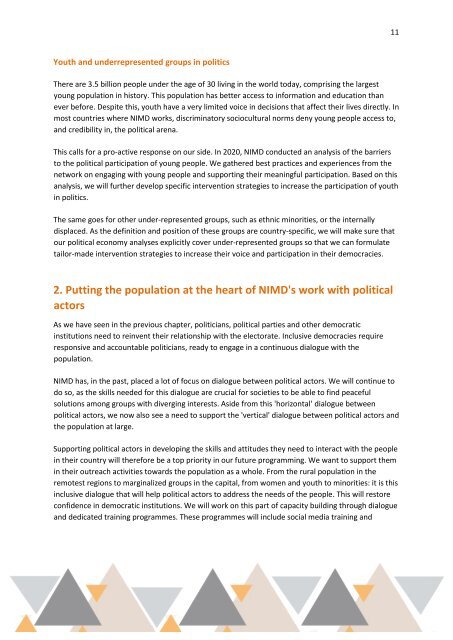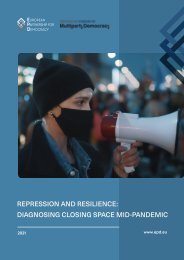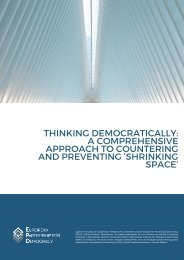NIMD Multi-Annual Strategy 2021-25
Create successful ePaper yourself
Turn your PDF publications into a flip-book with our unique Google optimized e-Paper software.
11<br />
Youth and underrepresented groups in politics<br />
There are 3.5 billion people under the age of 30 living in the world today, comprising the largest<br />
young population in history. This population has better access to information and education than<br />
ever before. Despite this, youth have a very limited voice in decisions that affect their lives directly. In<br />
most countries where <strong>NIMD</strong> works, discriminatory sociocultural norms deny young people access to,<br />
and credibility in, the political arena.<br />
This calls for a pro-active response on our side. In 2020, <strong>NIMD</strong> conducted an analysis of the barriers<br />
to the political participation of young people. We gathered best practices and experiences from the<br />
network on engaging with young people and supporting their meaningful participation. Based on this<br />
analysis, we will further develop specific intervention strategies to increase the participation of youth<br />
in politics.<br />
The same goes for other under-represented groups, such as ethnic minorities, or the internally<br />
displaced. As the definition and position of these groups are country-specific, we will make sure that<br />
our political economy analyses explicitly cover under-represented groups so that we can formulate<br />
tailor-made intervention strategies to increase their voice and participation in their democracies.<br />
2. Putting the population at the heart of <strong>NIMD</strong>'s work with political<br />
actors<br />
As we have seen in the previous chapter, politicians, political parties and other democratic<br />
institutions need to reinvent their relationship with the electorate. Inclusive democracies require<br />
responsive and accountable politicians, ready to engage in a continuous dialogue with the<br />
population.<br />
<strong>NIMD</strong> has, in the past, placed a lot of focus on dialogue between political actors. We will continue to<br />
do so, as the skills needed for this dialogue are crucial for societies to be able to find peaceful<br />
solutions among groups with diverging interests. Aside from this 'horizontal' dialogue between<br />
political actors, we now also see a need to support the 'vertical' dialogue between political actors and<br />
the population at large.<br />
Supporting political actors in developing the skills and attitudes they need to interact with the people<br />
in their country will therefore be a top priority in our future programming. We want to support them<br />
in their outreach activities towards the population as a whole. From the rural population in the<br />
remotest regions to marginalized groups in the capital, from women and youth to minorities: it is this<br />
inclusive dialogue that will help political actors to address the needs of the people. This will restore<br />
confidence in democratic institutions. We will work on this part of capacity building through dialogue<br />
and dedicated training programmes. These programmes will include social media training and

















